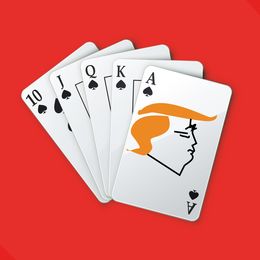The most powerful man in the world is also among the least original. President Donald Trump projects himself as a business genius, a brilliant billionaire and nifty negotiator. But his boastfulness is belied by his track record. If anything, his collapsed ventures unmask him as a loser, a failed serial entrepreneur whose enduring characteristics are megalomania and unoriginality. In 1989, he launched a board game called ‘Trump’ to rival ‘Monopoly’. Phil Orbanes, senior vice president of the company that was Trump’s first choice to produce the game, said, “It can leave you exhausted, feeling like you don’t want to play again.”
The complicated game with 12 pages of rules sold poorly. The 2004 revised version’s tagline was: “It takes brains to make millions. It takes Trump to make billions.” Both versions got terrible reviews. Wrote Mother Jones magazine, “This is a great game if you don’t have very many friends.” Listing the game among ‘Top 10 Donald Trump Failures’, Time magazine called it one of Trump’s “ridiculous ideas”. To rival the renowned cycling competition Tour de France, Trump launched Tour de Trump. It almost bankrupted him within a year. He started an airline—Trump Shuttle. It ran out of cash in three years. He launched hotels, casinos and entertainment resorts. Their last resort was bankruptcy.
In 2002, he launched the ‘Trump World’ magazine with his photo on the cover. It vanished. His financing company—Trump Mortgage—lasted two years. Trump had mocked “poor quality” Chinese clothing. Later, it was discovered his exorbitant Donald J. Trump Signature Collection was sourced from China. Spurned by customers, ‘Trump Vodka’, ‘Trump Steaks’, ‘Trump Ice’, Trump perfumes called ‘Empire’ and ‘Success by Trump’ and ‘Trump Home’—luxury furniture reflecting his lifestyle—were removed from stores, never to return. Critics found his furnishings “heavy on burl and brocade”. Says Professor Robert Reich, “The story of Trump as a successful businessman is based on a lie.”
Trump took his unoriginality from business to politics. His slogan—Make America Great Again—is borrowed from Ronald Reagan’s 1980 presidential campaign. It was embraced by voters suffering from unemployment and inflation due to the ongoing economic downturn. Reagan’s slogan—Let’s make America Great Again—was inclusive and empowering. Trump’s grandiosity emblazons he will and can make America great. Reagan coined the phrase; Trump copyrighted and virtually franchised it worldwide.
Presidential hopefuls have always used themes of American prosperity, greatness and exceptionalism. Trump’s ‘America First’ slogan is also not original. It has been used by wannabe presidents for 100 years. But in the 1930s, the slogan’s connotations darkened, becoming associated with American far right, racism, fascism and Hitler-sympathisers. In the 1940s, the isolationist ‘America First’ committee was made famous by aviator Charles Lindberg. “Tariff is a beautiful word,” Trump extols, but this policy, too, is borrowed from an American president who lived 125 years ago.
Trump had one original idea, but perhaps it was because others found it too absurd to pursue. In 2009, Trump introduced a controversial home urine test called—not ‘Trump Urine’—but PrivaTest. It supposedly indicates which vitamins people should take. Many distributors wound up burning large stocks. Harvard University’s Dr Pieter Cohen called PrivaTest a “scam”.
Former US president Barack Obama wrote, The Audacity of Hope. Trump could publish a ghostwritten book with a punchier title: ‘Audacity’. The ‘Trump Institute’ shuttered after police investigations. His unapproved “Trump University” closed in 2011 after settling lawsuits for illegal business practices including falsely calling itself ‘university’. Students paid exorbitant fees for five-day education. The course on offer? Entrepreneurship.
Pratap is an author and journalist.


